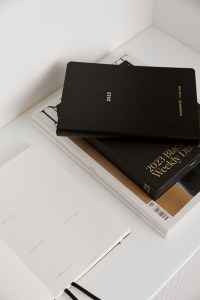Beck Wadworth is celebrating her 10th year in business at An Organised Life, when all she really wanted was to gift her family a personalised diary.
Key Takeaways
- Beck Wadworth founded An Organised Life in 2013
- Sales are up 55% year-on-year, with a renewed focus on corporate and wholesale customers
- Globally, the e-commerce hobby and stationery industry is projected to be worth US$147.2 billion by 2028

Diary season, as the stationery folk say, is chaotic.
It starts around October and ends sometime in January as people begin to reassess their goals and plan for the following year.
“It’s a crazy period,” says Beck Wadworth, founder of stationery company An Organised Life. It’s usually when hobby and stationery companies sell out their products. Wadworth didn’t even know there was a right time to sell diaries. Regardless, the launch of her signature monochromatic diary collection in 2013 was a hit. Now, Wadworth is celebrating a major milestone: Her 2023 collection marks the beginning of the 10th year of AOL.
A graphic designer by trade, Wadworth had always designed and created her own Christmas presents for her family. One year, when the Kiwi was living in Sydney, she decided to design and gift a diary.
“I designed it, was really happy with it, and went to print it. Then I found out the minimum printing amount was 300 units.” To hell with it, she thought. I’ll start a business.
Wadworth, who was 23 at the time, had some experience in public relations and social media, so she built a website to sell those 300 diaries. She sold out in three weeks.
“Looking back, I was probably naïve,” she admits. “I always wanted to start a business, and I loved being organised. But I had no idea about production or dispatch.”
So she called in a few favours.
“Mum and dad had to fly over from New Zealand, and my friends would come over after work to help me pack from my little apartment in Bondi. My house was covered in diaries.”
While the design has been elevated to a more premium look over the years, Wadworth says the brand still feels the same. She’s a minimalist at heart, wearing a black blazer, a slicked-back ponytail and a thin, gold pendant necklace. Even her homewares are sleek and stylish, with black steel candle holders and line-drawn art. That same minimalism can be seen in her products.

“The whole point is that it’s an understated essential that you can carry with you everyday.”
They have been – and still are – a huge hit, even among celebrities including actress Margot Robbie. “We gifted it to Margot, but her team loved it so much we ended up making personalised notebooks for her production company, Lucky Chap,” she says. Count UK model Rosie Huntington-Whiteley and Aussie actress Samara Weaving as fans, too.
The brand has thrived without any external investment and sales are up 55% year-on-year, which Wadworth credits to a new corporate focus.
“If you feel like you’ve nailed it, that’s when the wheels fall off.”
– Beck Wadworth, founder of An Organised Life
The business has developed corporate stationery partnerships with Net-A-Porter, Lexus, Air New Zealand and Aje, and her items are stocked in stores overseas, including Papersmiths in the UK and OFR in Paris.
“In the past 12 months, our wholesale is up 150%,” she says.
But her career high was landing a collaboration with fashion designer and fellow Kiwi Karen Walker. “I told my parents that the number one person I want to collaborate with is Karen Walker. So I emailed her team a big proposal, and they were like, ‘Let’s do it’. I was shell-shocked.”
“Always look ahead and never stand still,” she adds. “If you feel like you’ve nailed it, that’s when the wheels fall off.”
Wadworth, who is now a mother to her second baby (the first being her business, she says), still designs every single page and every single product. “I’ll carry on doing that,” she says. “Design is just my world.”
Globally, the e-commerce hobby and stationery industry hit a high of US$96 billion in 2020 – the pandemic was evidently a boon for the market. By 2028, the market is projected to be worth US$147.2 billion, according to Million Insights.
“There is definitely still demand for physical products. It’s still a market that’s getting bigger and bigger,” Wadworth says.